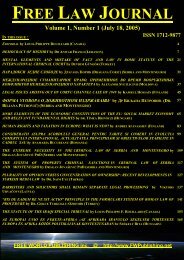WORLD HISTORY JOURNAL - VOLUME 3, NUMBER 1 (18 JANUARY 2007)2. THE PRINCIPLE OF INFLUENCE OR HEISENBERG’SPRINCIPLE:7. The German Physicist Heinsenberg considers that forsubatomic particles, both the exact position and the exact motioncannot be known at the same time. If the position of thesubatomic particle is known, the determination of its motion willbe uncertain; and if the motion of the subatomic particle isknown, the determination of its position will be uncertain. Weinfer from this principle that the process of investigation affectswhat is being investigated, and therefore that the phenomenon asobserved does not depict true reality. This principle continues topush back the boundaries of Physics. Heinsenberg himself, andPsychologists and Sociologists, have used this principle to defendimportant theological and philosophical concepts, such asuncaused events and free will.8. I say that no creator is able to participate in history if s/hedoes not exert an influence on the course of history. Gibran’sinvestigation of human society has affected what he hasinvestigated, all the more so since the social phenomenon as hehas investigated has not depicted true reality before the processof investigation. An indication of this is the adoption of theProtestant Churches, such as Lutheran Church and the UnitarianChurch and others, of texts from Gibran’s Prophet on Marriageand Death to be read at weddings and funerals.9. I do not find very convincing the argument that Gibran’sinfluence is on the general populace, and not on historicalthought, for no important thinker was under the influence ofGibran’s works. I say that historical influence does not happenonly among the peoples of thought. Agriculturists, carpenters,employees and employers, students and professors, journalists,institutions and universities, along with thinkers and innovatorsin all fields, Arts, Poetry, Science, and Philosophy, all are citizensof Democracy of History. If the Protestant community is a8DR. ANWAR FRANGI - DEMOCRACY OF HISTORY:THE CASE OF KAHLIL GIBRAN
WORLD HISTORY JOURNAL - VOLUME 3, NUMBER 1 (18 JANUARY 2007)historical religious community, and if Gibran has exertedinfluence on it, Gibran then would be among those who haveparticipated in history. I have not seen during my studies an<strong>dr</strong>esearch at the University of Poitiers in France or at the AmericanUniversity in Washington, D.C., or at Harvard University inMassachusetts, in the United States, but students and professorsreading or quoting from Gibran’s Prophet. The AmericanPresident John F. Kennedy himself referred to Gibran in hisinaugural speech in 1961 saying :“Ask not what your country can do for you; Ask what you can dofor your country.”10. If all those I have mentioned are citizens of Democracy ofHistory, and if Gibran has wielded an influence on them, and ifHeinsenberg’s Principle has participated in steering influenceinto history, then Gibran’s participation in Heinsenberg’sprinciple is certainly a participation in history. Yet, influencealone is not a mark of historical appreciation; for history requiresthat the influence be original. Thus, it is not enough that thephenomenon of Gibran would be deemed popular, and that itwould have existential effect. Its influence on the reality of thegeneral populace should also be original. We go on then to thePrinciple of Becoming.3. THE PRINCIPLE OF BECOMING:11. Becoming is the act of changing from one form ofexistence to another. Mere change of position or motion does notdepict the true nature of becoming. Thus, the creator shouldeffect a change in one form of existence.12. I say that the adoption of Gibran’s texts <strong>by</strong> someProtestant Churches in the United States is not a mere formalchange. It is an existential change in the way that we think aboutbehavior. This type of change is governed <strong>by</strong> the Regulative9DR. ANWAR FRANGI - DEMOCRACY OF HISTORY:THE CASE OF KAHLIL GIBRAN
- Page 1 and 2: FREE WORLD PUBLISHING Inc.HTTP://WW
- Page 3 and 4: WORLD HISTORY JOURNAL - VOLUME 3, N
- Page 5 and 6: WORLD HISTORY JOURNAL - VOLUME 3, N
- Page 7: WORLD HISTORY JOURNAL - VOLUME 3, N
- Page 11 and 12: WORLD HISTORY JOURNAL - VOLUME 3, N
- Page 13 and 14: FREE LAW JOURNAL - VOLUME 3, NUMBER
- Page 15 and 16: FREE LAW JOURNAL - VOLUME 3, NUMBER
- Page 17 and 18: FREE LAW JOURNAL - VOLUME 3, NUMBER
- Page 19 and 20: FREE LAW JOURNAL - VOLUME 3, NUMBER
- Page 21 and 22: FREE LAW JOURNAL - VOLUME 3, NUMBER
- Page 23 and 24: FREE LAW JOURNAL - VOLUME 3, NUMBER
- Page 25: WORLD HISTORY JOURNALThe War and Pe
















